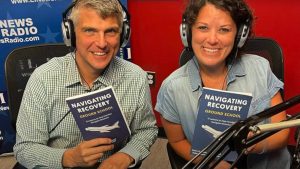Imagine addiction, the Cell Phone Analogy.
The hurt and destruction caused by addiction is undeniable. It’s difficult for families to understand why the person of concern doesn’t see what they see. Imagining addiction using a cell phone can give a little insight into understanding the challenge. Reframing addiction in terms of our cell phone habits may help us better understand the situation from the person of concern’s point of view.
Think you’re not addicted to your cell phone? What if I asked you to drop your phone in the mailbox and send it to me? Would you be able to do it? After years of habitual use, we’ve become reliant on our phones, constantly checking for new messages, reading the latest news, scrolling through social media. Now here I am, telling you to give it up. Difficult, right?
This is one way for families to better understand what it’s like when we ask someone to quit drinking. They’re being asked to relinquish something they’ve relied on, a tool that’s habitually worked for them, just like your phone is to you.
How would you feel if your phone was gone forever?
Imagine that I confiscate that your cell phone and do not promise to give it back.
- Do you have anxiety that something important was gone from your life?
- Is there a physical sense something was missing from your hand?
- are you worried you’re missing out on an important text or email?
- Do you feel concerned these feelings would never go away?
- Is it hard to function in the world without your phone?
- Are you angry at the person who took your phone away in the first place?
Suppose you decide to make the effort to try this life-without-a-phone thing. Remember, people under 40 have never lived without a phone and the majority, life without a cell phone feels unimaginable. Those of us who remember living without a phone would still need to dust off skills from decades ago. Remember maps?
Social media and gaming apps are designed to be addictive
Having to learn new skills or revisit old ones, like map reading or programming an answering machine, can feel strenuous. In this situation, we wonder why everyone else uses cells phones but we cannot. Resentment and comparison would begin to creep in. How would we check our emails? How would we get through life without a phone? We try convincing ourselves to head over to the Apple Store and buy a new one.
If we’re able to make it past those initial thoughts and feelings, we might start to become accustomed to life without a phone after a few months. Our brain would start to rewire itself. We will feeling that less social media access is healthier.
We could even have a landline installed and start making phone calls at home, relying on a phone book, instead of a digital contact list, so we could stay in touch with loved ones.
Although this method comes with some extra steps, it would be a great sense of relief to know we’d be able to make it through life with this new way of communicating. We’d start to feel confident in our ability to adjust and thrive in this new way of being.
Addiction manifests in lots of different ways
I use this analogy to help people better understand addiction because most of us, unknowingly, have a strong dependency on our phones. Think about your own habits: do you check your texts/emails before you get out of bed in the morning? Personally, I know when I misplace my cell phone, I exhibit withdrawal symptoms, such as frantically tossing around sofa cushions and being short with my partner.
When we ask someone to quit using, we are taking away something important to them, a safety blanket that they have relied on for years. Just as it takes time to adjust to life without a phone, it takes time to settle into a new way of life without drugs or alcohol. Similarly, the person of concern will also find these moments of joy and contentment within their recovery process.
As the person of concern releases these old patterns of behavior, patience will be required from those closest to them.
About Adam Banks
Adam Banks is a certified interventionist and the owner of Adam Banks Recovery. After receiving an MBA from the University of Chicago, Adam built a company acquired by United Health Care. His discipline and attention to detail comes from his former career as an airline pilot, holding an ATP, the FAA’s highest license.
Today, Adam is dedicated to helping others achieve long-term sobriety. His work has guided executives, pilots, and physicians on paths to recovery. Adam brings families together through a loving and inclusive approach.
Adam has authored four books on addiction. His recent work, Navigating Recovery Ground School: 12 Lessons to Help Families Navigate Recovery, educates families on the entire intervention process. He also offers a free video course for families considering an intervention for a loved one.
Adam is available for alcohol and drug intervention services in New York, Long Island, the Hamptons as well as nationally and internationally.




